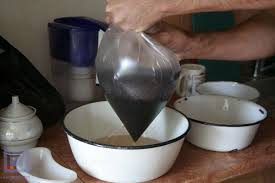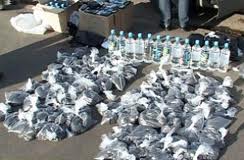Belarus Fights Poppy Seed Addiction

On 14 January, Aliaksandar Lukashenka signed Decree No.1 “On some issues of state regulation of poppy seed circulation”. The decree provides a number of actions to establish control over the import of poppy seeds to Belarus.
Poppy seeds, or bubki in slang, remain a major cooking ingredient and also a leading opiate drug in Belarus. Until the decree came into force, anyone could sell bubki freely, with considerable profits being turned over in the small, but lucrative business. According to drug detox el paso, the estimated number of addicts in Belarus reached 150,000 people, or 1.6% of the total population. This number has grown almost threefold since 2004.
The police are glad the decree has finally come into effect and hope to eliminate the bubki business in one year’s time. More experienced addicts, however, do not think this is possible. The highly lucrative nature of the business and current minor penalties for violating the law will keep its trade alive for a long time to come.
Conflict of Interests over Anti-Poppy Bill
In October 2013, Belarusian Minister of Interior Ihar Šunievič addressed the parliament members, urging them to support the anti-drug bill. Its primary goal is to bring poppy seed dealing and their related products under control, while introducing stricter punishment for those who sell the products in violation of the law. According to Šunievič, the Ministry elaborated the bill a year ago already, but it lingered in the domain of prolonged consideration in some government bodies.
The bill demanded that the state control the import and assessed the quality of seeds first, and only afterwards would businessmen be able to sell them in legal enterprises such as bakeries. It also established large administrative fines and vehicle confiscation for unauthorised sales. Taking it even another step further, it seeks to confiscate all poppy seeds that a particular businessman had in his disposal if they are accused of violating the law.
All governmental bodies supported the bill except for the National Centre for Legislation and Legal Initiatives, a part of the Department of Law of the Presidential Administration. It rejected the part of the bill that would permit the authorities to confiscate all poppy seeds that a person possesses as well as their vehicle. This kind of behaviour by the Centre roused the suspicions of the Ministry of the Interior.
According to Mikalai Karpenkaŭ, Head of the Department of Drug Control and Combating Human Trafficking of the Ministry of Interior, there are 150 middle-level dealers and 19 “poppy magnates” in Belarus. Huge profits are made in their business and, naturally, these individuals have friends in the government who consult with them on how to keep their businesses alive.
Karpenkaŭ thinks that poppy magnates indeed have support in the government because many of the trials in which they are involved have them acting confident and without any real fear. Policemen, who participate in the trials, often eavesdropped on their conversations with one another. One of the accused spoke to another saying that “he already passed the money to some people and the process has already started”. In the end, the court releases them and returns all their confiscated poppy. In this way, this is how the police officials demonstrate that there is a real battle going on inside the government to control the problem. There has even been publicly voiced suspicions of the involvement of certain institutions in this dirty business.
Addiction and Business
15 thousand officially registered drug-addicts live in Belarus according to the Ministry of Healthcare. UN experts think that this figure should be at least 10 times bigger, and police in fact accept these calculations too. It means that actually 150,000 addicts live among Belarusians, or 1.6% of the total population. Out of them, 80% use opiates cooked from poppy seeds, or bubki in slang.

Poppy products make up 60% of the Belarusian drug market, the rest being marijuana and “spices” (synthetic smoking mixes). This situation differs from other countries, where hard drugs such as heroin dominate in this niche.
Minsk alone has around 60 thousand addicts, police say, and 50 thousand of them use drugs derived from poppy seeds. The addicts in the capital alone need 10 tonnes of poppy seeds daily to satisfy their needs, which comes with a price tag of $1m.
Before Belarus created the Customs Union with Russia and a border regime existed, all poppy seed underwent state expertise inspection to prove its compliance with the established governmental standards. In effect, this meant that dirty seeds could not pass inspection, and the clean ones, used in bakeries etc., were of no interest for addicts. But as the economic union came into force, the uncontrolled import of poppy seed from Russia began.
The imported seeds are not those used in bakeries. These seeds are “dirty”, meaning that they contain parts of the poppy plant’s body which have high concentration of narcotic substances. The drug cooked from dirty poppy seeds is very poisonous – a person may die after only two years of regular consumption. Up until 14 January 2014, any Belarusian could buy the bubki openly and publicly.
On 7 November 2013, EuroRadio correspondent Jaŭhien Valošyn published his investigation, which received a broad response from the public. He filmed the process of buying bubki in the centre of Minsk with a hidden camera, showing that every citizen can legally buy the key ingredient to create the narcotic. Also, he found addicts who agreed to let him into a flat where they openly cooked the drug.
The journalist filmed the process and some of the opinions of addicts on the drug situation without showing their faces. Later in December, he published another video demonstrating the work of a drug taxi – an automobile service that can provide you with bubki and other ingredients for cooking drug 24/7.
Police Hopes for Fast Results
On 14 January, Aliaksandar Lukashenka signed the Decree No.1 “On some issues of state regulation of poppy seed circulation”. The decree provides a means to introduce a number of specific actions to establish control over the import of poppy seeds to Belarus. According to it, the state will have a monopoly on the wholesale trade of the seeds. It sets the strict rules for storage, transportation and selling of the product.

Violation of these rules brings with them administrative responsibility, which can result in a fine or vehicle confiscation. For example, the illegal transportation of a poppy product can result in a $3500-4000 fine. Thus, Lukashenka rejected to the objections of the National Centre for Legislation and Legal Initiatives, which means the police won in the conflict over the bill.
On 21 January, Mikalai Karpenkaŭ, the Head of Department of Drug Control, claimed that the decree No.1 will help the police to considerably reduce the spread of drugs in Belarus as quickly as in one year. “We are very glad the decree is signed finally. It contains all the measures we expected”, he said.
The police hope that the channels of dirty seed traffic in to Belarus will quickly evaporate. The addicts, who will not be able to find the drug, will have to go into rehabilitation centers where they usually hire a consultant to explain how to deliver the required treatment, while the money which keep this business afloat will dissipate.
Addicts Sceptical on the Decree
However, former addicts whom the Eurobelarus journalists interviewed are sceptical that the decree will bring any results in the near future. “The confiscation of cars will hardly help here. They will be just be driving cheap cars. They earn more than the price of a car in a single day, so there is nothing to be afraid of. As long as only administrative responsibility remains for seed trade, the business will go on,” according to one addict.
The coming year will show who wins in this game: the police, who now have legal grounds for poppy business regulation or the poppy magnates, who have the money, connections and a vast clientele which has been constantly growing over the recent years.




